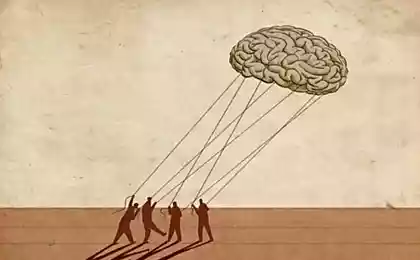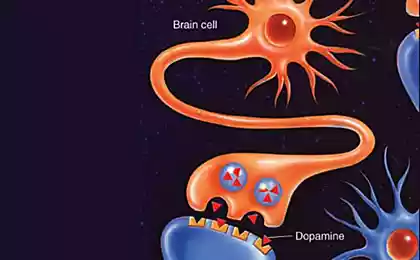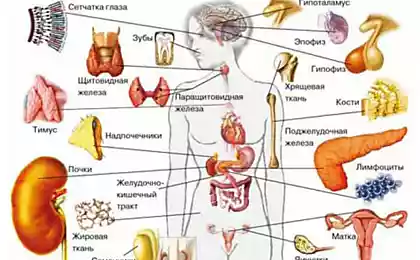447
Sensitivity to context
Forty four million five hundred nine thousand two hundred forty two
We are not so much important for a healthy personality quality as sensitivity to context. A lot of people daily make decisions based on their own, sometimes unique criteria when choosing. However, these criteria are sometimes extremely far from what can be called everyday reality, they are taken out of context, in which we all live. And then are the real solutions-the beast in no way connected with what is happening with us or with the world.
The famous American social psychologist R. Nisbett once asked this question: "Imagine a chicken, a cow and grass. One of these items once. Think, what of them superfluous?". If you chose the extra grass (or was it the first impulse), then you relying on abstract categories or properties ("flora-fauna", "mobile-stationary", etc.), ignoring the context, made analytical choices (such and encouraged in our culture-oriented logic). The analytical facilities in the world exist by themselves, outside of context, outside of their field. If you chose the extra chicken (on the grounds that the cow eats grass and chicken – no), you do holistic ("wholistic") choice, based not on logic, but on experience, considering the interaction between the components of objects. That is, the analytical understanding of the world the objects exist by themselves, in a holistic – only in interaction. The use of analytical thinking in science has allowed to achieve impressive results, which led to the orientation of school and University education on him. The problem is that in everyday life is more important than the ability to pay attention to the context. And this is not taught.
Sensitivity to the context around us is a sensitivity to reality. What is the reality? In the broadest sense – that surrounds us. What I can't change the objective reality. What I can is subjective. The border between these realities is movable, and it largely determines the person involved into the interaction with many objects. When I carefully gaze at the world around me, everything I have, only makes sense in the context of how it helps me to this world to establish a relationship. For example, I'm going with the bike. Good thing the bike? Objective-in the abstract – Yes, good. However, at the moment he had blown a tire, and I have a few kilometers of his message then why waste plenty of time. And in this context is not good. To save a life – the highest value? And if it's a dictator who after he will put on a foot doctor will sign the order about the shooting of another objectionable?
A lot of people, without knowing it, rely on abstractions: good and evil, truth and falsehood... Attempt to apply these analytical abstractions to life without the involvement of the context lead to two possible options: either to their destruction or to the destruction of the world with which these abstractions collide. H. Herzog cites a striking example. One of the societies of protection of animals in the United States quite seriously began to distribute leaflets with an appeal to abstain from meat chicken and go to eating whale meat. What explains this amazing offer? Integrity and logic. Take 100 chickens and one ox. They are about the same amount of meat. But in the case of chickens will have to commit one hundred murders, and the case of the ox are one. And now guess why it is better to kill the whale, not the bull... In the end, the animal urge to kill animals. In other cases, defenders of life are willing to kill some to protect the lives of others... That really does not fall out of the real world, we have to go on a moral bargain with ourselves.
The context leads to a straightforward sequence. Since you said "And" now until the end of life, fundamentally, in spite of the changed reality and the relationship, you should say "A". Never forgive, for example... the World of linear circuits, simple solutions and bigotry, get rid of anxieties. If you do not like Putin is all bad, what he does, even if its decision contradicts the other bad, both because of Putin (Putin's place you can substitute any). Any radical movement is always detached from reality, drifting into abstraction. Radical feminism, clinging to "the Patriarchy", "rape culture" and other ideologies, bringing his racism; racism/Nazism in all its manifestations, reducing all problems to race/nationality (also quite abstract concepts hard to understand without the context); the childfree, it says "children are evil!", vegan with "meat eaters – the carrion eaters!" and many other currents that try to operate with absolute categories, they all are floating somewhere in the sky where it's hard to see what surrounds them "sacred cows".
Why it is true the words "it depends" cause so much irritation for a considerable number of people? Why so stubbornly ignored the situational variability of behavior and popular psychological typology, promising "to give an accurate prediction of how people will behave"? This is because passion for simple recipes, shortcuts and solutions that are applicable everywhere and always, reduces the level of anxiety and the need for each time in an ambiguous situation to turn your head and make an informed choice. Easier to navigate on the schema, however, and the choice then is not deliberate, and abstract. And conscience is silent, because mistakes will be the responsibility of the schema, not the people...
In General, if we want to keep contact with the real world, you have to ask: in what context were these words said? The context in which this event occurred? In which situation this phenomenon to be good, what is evil? In a situation of conversation, it is important to talk exclusively about what you speak, and to suppress any attempt of total synthesis and the involvement of other contexts. The subject should always be in focus – if possible, and get to talk about it. It will be a conversation about life, not about the abstract analytical category of "bad – good", "right – wrong". published
Author: Ilya Latypov
Source: tumbalele.livejournal.com/93481.html
We are not so much important for a healthy personality quality as sensitivity to context. A lot of people daily make decisions based on their own, sometimes unique criteria when choosing. However, these criteria are sometimes extremely far from what can be called everyday reality, they are taken out of context, in which we all live. And then are the real solutions-the beast in no way connected with what is happening with us or with the world.
The famous American social psychologist R. Nisbett once asked this question: "Imagine a chicken, a cow and grass. One of these items once. Think, what of them superfluous?". If you chose the extra grass (or was it the first impulse), then you relying on abstract categories or properties ("flora-fauna", "mobile-stationary", etc.), ignoring the context, made analytical choices (such and encouraged in our culture-oriented logic). The analytical facilities in the world exist by themselves, outside of context, outside of their field. If you chose the extra chicken (on the grounds that the cow eats grass and chicken – no), you do holistic ("wholistic") choice, based not on logic, but on experience, considering the interaction between the components of objects. That is, the analytical understanding of the world the objects exist by themselves, in a holistic – only in interaction. The use of analytical thinking in science has allowed to achieve impressive results, which led to the orientation of school and University education on him. The problem is that in everyday life is more important than the ability to pay attention to the context. And this is not taught.
Sensitivity to the context around us is a sensitivity to reality. What is the reality? In the broadest sense – that surrounds us. What I can't change the objective reality. What I can is subjective. The border between these realities is movable, and it largely determines the person involved into the interaction with many objects. When I carefully gaze at the world around me, everything I have, only makes sense in the context of how it helps me to this world to establish a relationship. For example, I'm going with the bike. Good thing the bike? Objective-in the abstract – Yes, good. However, at the moment he had blown a tire, and I have a few kilometers of his message then why waste plenty of time. And in this context is not good. To save a life – the highest value? And if it's a dictator who after he will put on a foot doctor will sign the order about the shooting of another objectionable?
A lot of people, without knowing it, rely on abstractions: good and evil, truth and falsehood... Attempt to apply these analytical abstractions to life without the involvement of the context lead to two possible options: either to their destruction or to the destruction of the world with which these abstractions collide. H. Herzog cites a striking example. One of the societies of protection of animals in the United States quite seriously began to distribute leaflets with an appeal to abstain from meat chicken and go to eating whale meat. What explains this amazing offer? Integrity and logic. Take 100 chickens and one ox. They are about the same amount of meat. But in the case of chickens will have to commit one hundred murders, and the case of the ox are one. And now guess why it is better to kill the whale, not the bull... In the end, the animal urge to kill animals. In other cases, defenders of life are willing to kill some to protect the lives of others... That really does not fall out of the real world, we have to go on a moral bargain with ourselves.
The context leads to a straightforward sequence. Since you said "And" now until the end of life, fundamentally, in spite of the changed reality and the relationship, you should say "A". Never forgive, for example... the World of linear circuits, simple solutions and bigotry, get rid of anxieties. If you do not like Putin is all bad, what he does, even if its decision contradicts the other bad, both because of Putin (Putin's place you can substitute any). Any radical movement is always detached from reality, drifting into abstraction. Radical feminism, clinging to "the Patriarchy", "rape culture" and other ideologies, bringing his racism; racism/Nazism in all its manifestations, reducing all problems to race/nationality (also quite abstract concepts hard to understand without the context); the childfree, it says "children are evil!", vegan with "meat eaters – the carrion eaters!" and many other currents that try to operate with absolute categories, they all are floating somewhere in the sky where it's hard to see what surrounds them "sacred cows".
Why it is true the words "it depends" cause so much irritation for a considerable number of people? Why so stubbornly ignored the situational variability of behavior and popular psychological typology, promising "to give an accurate prediction of how people will behave"? This is because passion for simple recipes, shortcuts and solutions that are applicable everywhere and always, reduces the level of anxiety and the need for each time in an ambiguous situation to turn your head and make an informed choice. Easier to navigate on the schema, however, and the choice then is not deliberate, and abstract. And conscience is silent, because mistakes will be the responsibility of the schema, not the people...
In General, if we want to keep contact with the real world, you have to ask: in what context were these words said? The context in which this event occurred? In which situation this phenomenon to be good, what is evil? In a situation of conversation, it is important to talk exclusively about what you speak, and to suppress any attempt of total synthesis and the involvement of other contexts. The subject should always be in focus – if possible, and get to talk about it. It will be a conversation about life, not about the abstract analytical category of "bad – good", "right – wrong". published
Author: Ilya Latypov
Source: tumbalele.livejournal.com/93481.html























